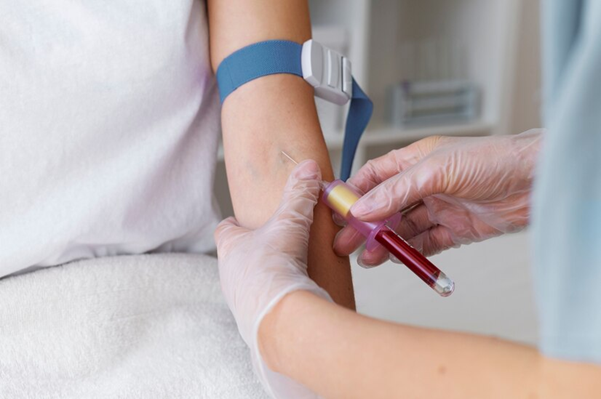HIV Test: Everything You Need to Know Before You Get Tested
- Home

HIV testing is important for knowing and managing your health. It helps control the spread of HIV infections worldwide. Efforts globally are focused on reducing ignorance about HIV status, which aids in prevention. These initiatives ensure timely treatments and a lower chance of spreading the virus.
Many people don’t know they have HIV, hindering control efforts. In India, several people live with undiagnosed HIV, making testing crucial. Public health faces challenges when awareness is lacking, highlighting the need for accessible tests.
India has made progress in tackling HIV/AIDS. Recently, around 2.3 million people in India are estimated to be living with HIV. It’s important to understand these numbers to make effective intervention plans for prevention and control in India. The focus is to reduce the figures with education and easy access to testing services.
Understanding HIV: It’s More Than Just a Virus
HIV attacks special cells in the immune system, called CD4 cells. Without these cells, your body can’t fight infections as easily. As HIV progresses, it can lead to AIDS, which weakens the immune system.

Knowing you have HIV early can help start treatment soon. Treatment is important because it keeps the virus low in your body, which helps you stay healthier. Regular testing helps find HIV early so that treatment can begin sooner.
Testing for HIV is very important for both you and others around you. It helps you stay healthy and stops you from spreading the virus to others. When more people know if they have HIV, communities can reduce how often new infections happen.
Navigating HIV Test Options in India
You can choose from many HIV tests available in India today. Rapid tests provide quick results, ready in about 30 minutes for your convenience. The ELISA test is still a widely used method, known for finding HIV antibodies accurately. Both these testing methods are essential in the fight against HIV and AIDS prevention.
Self-testing kits are becoming popular as people prefer privacy and ease. You can find these testing kits in local shops or order them online. Self-testing helps make HIV and AIDS prevention more accessible to more people, particularly those who hesitate to visit clinics.
Dual testing for HIV and syphilis is gaining importance, especially in care during pregnancy. Pregnant women take these tests to lower the risk of passing HIV to their babies. This proactive step highlights how solutions for HIV and AIDS can offer various protections through better healthcare approaches.
Step-by-Step Through the HIV Testing Process
Individuals begin with pre-test guidance, explaining the HIV test process clearly. During this time, they learn what to expect from the outcomes, ensuring they understand the basics of HIV and AIDS prevention. Counselors are there to address any pressing concerns or lingering misconceptions about the tests, offering essential coping strategies for various results and emphasizing that knowing one’s HIV status leads to empowerment and effective prevention of HIV/AIDS.
The HIV test itself is a simple procedure. At the clinic, a healthcare worker discusses each step in detail before testing begins. They obtain consent first, ensuring everyone is comfortable before taking a small blood sample, often from a finger prick. Rapid tests deliver results quickly, within minutes, whereas some other types take additional days for processing. This streamlined procedure aims to cause minimal discomfort and can easily fit into a busy day.
Privacy during HIV testing is extremely important. Healthcare providers follow strict measures to keep sensitive details secure and confidential. When individuals feel that their privacy is protected, trust in the healthcare system grows, making them more likely to seek regular tests willingly. Discreet results handling creates a supportive atmosphere where fostering awareness about AIDS and its prevention becomes achievable.
A Look at HIV Self-Testing: Independence and Privacy
Self-testing for HIV empowers individuals to check their status at home. This method has gained approval, tackling stigma and privacy concerns while boosting HIV/AIDS awareness and prevention efforts.
Self-testing kits mainly detect antibodies using an oral swab or finger prick. These kits provide trustworthy results, though follow-up testing is advised for positive cases. With clear instructions, self-testing encourages more people to join HIV prevention campaigns.
In India, self-testing offers privacy and ease, though challenges remain. Accessibility and costs might differ across regions, and follow-up care might be lacking. Yet, anonymous testing can boost participation rates, aiding HIV/AIDS prevention strategies. Building strong support systems will enhance self-testing advantages.
Timing Matters: When to Get Tested for HIV
Frequent testing remains crucial for those at heightened risk, like people with many partners or engaging without protection. Usually, an annual HIV test is suggested for most, while higher-risk groups should consider testing every few months. Regular check-ups truly aid in the prevention of HIV/AIDS.
Immediate HIV testing is vital in certain situations. Engaging without protection, sharing needles, or potential workplace exposure requires urgent testing. Quick detection during the window period enables early access to required and effective HIV/AIDS control measures.
Routine HIV tests are critically significant for pregnant women to reduce risk to babies through vertical transmission. Regular tests in all demographics bolster collective HIV/AIDS prevention, providing knowledge while reducing transmission and encouraging a culture of responsibility and awareness.
Demystifying HIV Test Results: What They Mean for You
Getting your HIV test results is an important step in knowing your status. When you get a negative result, this usually means HIV is not present, as long as there have been no recent risky exposures. A positive result means the test found HIV antibodies in your blood, which means you have HIV. This news begins a journey of managing your health and seeking treatment options.
The window period is tricky to understand but very important. After getting exposed to HIV, it may take between two to eight weeks for tests to find the virus. Testing during this time might show negative even if someone is infected. Waiting until the window period ends for testing gives the most accurate picture.
Sometimes, several tests are needed because of how HIV progresses over time. If you’ve been in high-risk situations or had recent exposure, more tests might be necessary to confirm what your current status truly is. This ongoing testing helps to see if you belong to those who initially test negative but turn positive later. That’s why keeping track of testing schedules and results matters a lot.
Navigating Life Post-Test: The Next Steps
Receiving a positive diagnosis can feel overwhelming at first. It’s crucial to quickly see a doctor or medical expert to discuss treatment options tailored for HIV situations. Crafting a solid treatment plan is key, focusing on medications and regular health checks.
In India, numerous services support individuals diagnosed with HIV. The government and NGOs provide free ART, ensuring that medical care is accessible everywhere. These resources are vital for ongoing health management and support.
If you test negative, continue safeguarding your status through proper methods. Use consistent strategies like condoms and consider taking PrEP if your lifestyle exposes you to higher risks. Engage in open discussions with partners about mutual testing and preventative measures.
Staying educated grants peace of mind and helps in effective HIV prevention. Being informed about the available preventive and treatment services fosters community health and personal well-being.
Integrating HIV Testing with Broader Prevention Measures
The pill known as PrEP helps stop you from getting HIV. It’s a daily defense for those who face high risks, acting as a key plan in HIV prevention. Strategies include using condoms and staying regular with testing.
Knowing whether you have HIV helps start better prevention tactics. Mix things up with strategies like PrEP and routine checks to lower your risk. Teaching the community and spreading awareness brings down new HIV cases.
Telling partners your HIV status and advising tests keeps everyone safe. It’s not only about you; it’s about making sure your partners and communities stay healthy too. Mutual testing is a double win for staying responsible.
Addressing Challenges: Overcoming Barriers to Testing
Stigma around HIV testing is a big hurdle to overcome. Myths must be shattered, and facts provided regularly to shift perceptions. AIDS awareness programs are important for teaching accurate information and stopping stigma in communities.
Rural areas face greater challenges in accessing HIV tests than urban ones. Cities have more resources for testing and treatment, which widens the gap. We need plans to reach these areas and make sure everyone can get HIV prevention measures.
Groups at higher risk require specific strategies to address their challenges. This means spreading awareness about and access to PrEP, community tests that respect privacy, and services that honor culture. Partnering with community leaders helps increase impact and reach.
Looking Ahead: The Future of HIV Testing in India
Home testing kits for HIV are making testing more accessible in homes. These kits reduce the time between worry and finding out results quickly. With such kits, everyone can easily test themselves whenever they want.
Places like clinics and community centers are offering more HIV testing opportunities. Moving testing directly to communities helps find HIV cases sooner. Roadshows and mobile units can reach people who do not often visit clinics. This helps with finding problems early and getting help fast.
Some healthcare centers now include HIV testing with other services offered. When different organizations work together, it improves how far testing can reach. Partnering with NGOs can make these efforts easier to put into action. Such teamwork is important for better control and prevention of HIV/AIDS.
Where to Find Help and Resources in India
You can find numerous Indian organizations that support those with HIV. Many NGOs and groups offer counseling and educational initiatives to those in need of guidance.
Reliable online platforms provide a wealth of valuable information on HIV/AIDS prevention, treatment, and support services. These digital resources help maintain privacy while offering essential awareness tools for everyone.
The Government of India runs many programs focused on AIDS prevention, treatment, and support. State-sponsored efforts ensure access to vital treatment and preventive measures. Collaborations with local groups strengthen these efforts and widen their impact.
It’s important to get an HIV test regularly if you’re at risk. A test helps catch potential infections early for timely treatment. There are several testing options available, including home kits, for more privacy. If you suspect exposure, testing quickly is crucial to begin any needed interventions.
Education on HIV prevention involves understanding how transmission occurs and how it’s stopped. Simple preventive methods, like using protection and regular testing, are effective strategies. Utilizing resources like pre-exposure prophylaxis (PrEP) helps reduce infection risks significantly.
Take control of your health with timely HIV testing — early detection empowers treatment and prevention.
Get tested confidently with Askam Healthcare’s trusted services.
Protect yourself and your loved ones — schedule your HIV test today!
